From Pixel to Plate: Aligning farmers to a data-driven economy
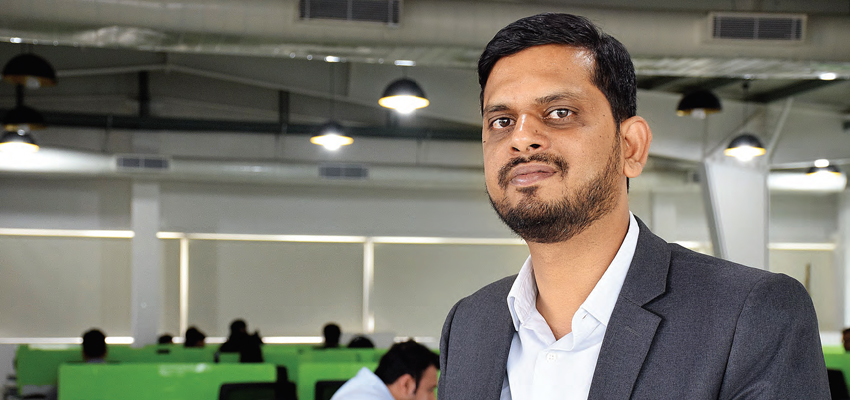
The advent of tech-based applications in the 2000s that initiated the boom of consumer internet usage further exploded with the fintech revolution in the late 2010s. However, aligning technology to the agriculture sector was still unheard of. Disrupting set patterns of farming practices by syncing data-driven technology was more than a revolutionary thought not just in India but within developed nations too. But, daring to incorporate data science and algorithms to farm sector management were three professionals who quit their cushy MNC careers to build a SaaS (software as a service)-based farm management platform which has been scaled across 56 countries and raring to grow. Krishna Kumar, Founder and CEO, CropIn Technology shared how the idea seeded out of EQ (emotional quotient), with the objective of transforming lives within the farming fraternity. Krishna Kumar spoke to Corporate Citizen about harnessing technology for longterm sustainability of the agri sector
“The next decade belongs to AgTech (agricultural technology) because you need food, and if you have to feed close to 10 billion people across the world by 2050, farm efficiency must increase by 35-75%,” said Krishna Kumar, Founder and CEO, CropIn Technology. With this strong conviction, Krishna Kumar along with his childhood friend Kunal Prasad, Co-Founder and Chief Operating Officer (COO) at CropIn joined hands with former colleague, Chittaranjan Jena to lay the foundation of an Agri-tech concept.
EARLY DAYS
With a passion to bring state-of-the-art technology in agriculture, Krishna Kumar left his lucrative job at GE (Information Management Leadership Program) and soon Krishna’s classmate and childhood friend, Kunal Prasad (former Manager–Sales Marketing, Tata Motors) joined as COO, CropIn, post his MBA course. Later Krishna’s GE colleague, Chittaranjan Jena (former Architect with GE Aviation), who had prior experience in the supply chain management, joined as CTO, CropIn. Although Jena quit the company in 2019, the inception of the company in 2010 rests on these three shoulders. A ‘full-stack AgTech’ organisation, CropIn believes in enhancing “per acre value” with the intervention of mobile, analytics, remote sensing, MI (machine intelligence) and AI (artificial intelligence). The company currently operates across 56 countries, has digitised over 13 million acres of farmland, and impacted the lives of nearly four million farmers globally.
SEEDING AN AGRI-TECH REVOLUTION
"Through Agtech solutions, we are working towards building a socially good and valuable chain for the future. We wish to ensure sustainability in the Agri ecosystem and make agriculture more data-driven"
- Krishna Kumar
Corporate Citizen (CC): Why did you choose a tech-run agri concept?
Krishna Kumar: The decision to bring in digitisation in the agriculture sector was more of an emotional decision than intentional. The plight of farmers facing lack of information, lack of knowledge on changing climate conditions leading to a ‘no transparency’ in the process pushed me to dedicate myself to solving these challenges. We identified that the sector had minimal and outdated technology and the stakeholders in the sector were unable to make informed decisions. I was keen to see how technology and data analytics can be used to improve yields and solve complex challenges. This is how we started CropIn and now we have our operations in 56+ countries.
CC: How do you categorise your business model?
CropIn largely works on the principle of a B2B business model, catering to agricultural businesses at different levels of the agro-ecosystem. We do not engage with farmers directly, but they are the ultimate beneficiaries of our solutions. We have positioned CropIn uniquely in the market to offer B2B solutions to the entire agri ecosystem. Our innovative suite of products renders first-mover advantage by allowing us to stay ahead of the competition and claim leadership position in the industry.
CC: Were there other similar startups when you conceptualised the idea in 2010?
When we started CropIn, there was minimal competition as the wave of digital technologies had not been introduced within the agriculture sector. The situation has since changed and the value of digital transformation in the agri-economy has been realised. The space is still unexplored which has the potential to open up a huge opportunity for the right platform to service the sector’s needs.
THE FIRST WAVE
"We started as a B2C company but within 6-8 months, we realised that the B2C model is not scalable, and we switched to the B2B model. We built on the platform approach by building crop and location-agnostic platforms which can scale quickly in any geography"
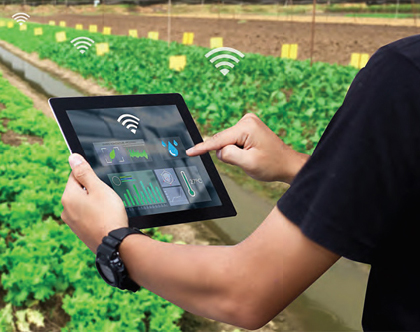
CC: What were the parameters considered in developing your business model?
The prime reason was the growing access of smartphones and Internet services to the remotest of rural areas, as well as the support available from the State and Central Governments by way of investments in agricultural infrastructure, along with various government schemes to improve the farmer’s income. These factors created a favourable ecosystem for venturing into AgTech. With farmers and agri-businesses constantly trying to increase their crop production without compromising on nutritional value, sustainable farming has become the need of the hour, with companies and individuals thriving to get the best yield and reduce wastage, with minimum inputs.
CC: Has there been any change in the initial business model since its inception?
It was a series of transitions and critical decisions we had to take in our journey which has helped CropIn to scale globally. We started as a B2C company but within 6-8 months of starting up, we realised that the B2C model is not scalable, and we switched to the B2B model. We built on the platform approach by building crop and location-agnostic platforms which can scale quickly in any geography. We decided to scale globally and made necessary changes in our product to service global customers and meet their standards. We decided to invest in AI and ML technologies to advance agriculture sciences using data and building on agriculture knowledge graphs.
CC: How difficult was it to convince your end customers, especially farmers for a tech-driven farm management system?
When we began as a B2C company, technology was at a nascent stage in India. It was equally challenging to convince farmers to adopt solutions that they had neither seen nor aware of. Moreover, adopting a technology solution requires an investment and if you are targeting farmers with an acre of land, it may not offer an immediate great return on investment, an underlying limitation with any technology-driven solution. We learnt that the success of precision farming depends on engaging with our target markets and made the transition from B2C to B2B to gain inroads at all possible opportunities within the farm sector.
CC: Did you face any drawbacks with the B2B model?
It took a considerable amount of time and effort to convince agri-businesses on the B2B model, especially on the aspects of trusting a startup and how this technology has the possibility of transforming the agriculture sector for both farmers as well as corporate organisations. Our team physically worked with these companies and contract farmers in their farms to understand the finer nuances of the agricultural business, their supply chains, the market dynamics, and the customer needs at each step of the process. This helped the company to modify and evolve solutions based on customer and market needs.
BUILDING THE TECH WAVE
CC: Did you innovate technology to cater to your business model?
The company has developed mobile applications of its products that it offers to the agri-businesses—facilities and services that links itself to banks and financial institutions, insurance companies, input companies, domestic and multinational food processing companies. These service providers when they visit a farm, geo-tag the piece of land. Subsequently, the characteristics of this farm area are then mapped using satellite images. The idea is to build a technology platform to connect the farmer seamlessly with the lending and corporate ecosystem.
CC: How do farmers connect via your agri-app platforms?
CropIn platforms enable farmers to practice data-driven farming and by providing precise advisory around their crops. Every farm on the CropIn platform is monitored through satellite to detect anomalies and to predict the health and yield of crops every 15 days. The satellite images are used to inform the farmer and agri-businesses on the likely yield, whether the entire plot is well irrigated or not, whether it has a sufficient quantity of pesticides and fertilisers, and whether there is any problem with a particular patch in the field. Such information can alert a farmer to undertake immediate remedial measures. These alert messages are sent to the farmers in the local language. In addition, CropIn’s climate module monitors the changing weather conditions on every plot by providing a weather-based advisory.
CC: What is your unique selling proposition?
CropIn’s consistent focus is on making the solutions more diverse in their implementation, prioritising client satisfaction through an in-depth understanding of the challenges faced and the ever-innovative attitude of our product team adds commitment to our vision. We understand the market and hence, introducing new and continuous innovation in our offerings, make our solutions adaptable in nature, thus, building trust in our solutions and ultimately, in us.
CC: How have you integrated stakeholders within your business model?
CropIn largely works on a B2B model catering not just to one industry vertical but to many segments. The product offered to each segment varies according to the requirement and the geography involved. CropIn caters to various customer segments at different levels of the agro-ecosystem, such as seed production companies, agri-input companies, government bodies, development agencies, exporters, commodity traders, and BFSI, thereby, providing a platform that benefits all stakeholders, including the farmer. Depending on the use case, CropIn provides platform licenses per user or per acre to such organisations.
DATA-DRIVEN FARMING
"SmartFarm enables agri-enterprises to adhere to food safety standards thereby ensuring farm-to-fork traceability"
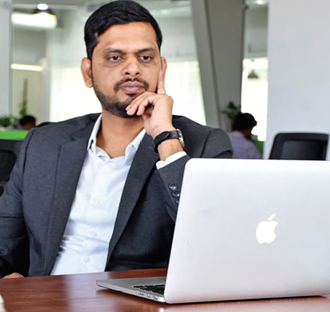
CC: How does your tech offerings interpret data for your stakeholders?
CropIn’s data-driven farming solutions enable agri-enterprises and growers to ‘maximise per-acre value’. Our farm data and agronomy management platform, SmartFarm, empowers stakeholders to improve efficiency, productivity, predictability and sustainability of their crop value-chains. SmartFarm enables agri-enterprises to adhere to food safety standards thereby ensuring farm-to-fork traceability. The platform helps growers adopt sustainable farming practices to build long-term economic viability and resiliency for local farming communities. CropIn has partnered with several global players in agriculture, including development finance institutions and government entities in 56 countries, to drive their digital and sustainability goals.
CC: Which is the other important app-driven farm solutions on offer?
CropIn’s ML-based predictive analytics platform, SmartRisk, improves underwriting and risk assessment, enabling banks, insurance providers, and other financial institutions to make informed underwriting decisions. Besides, the app helps to identify new markets and expand product portfolios to service high-volume low-ticket opportunities. By analysing and interpreting farm-centric data for over 388 crops with nearly 9,500 variants across trillions of data points that grow every day, SmartRisk helps achieve high prediction accuracy at a plot level. It does this by combining computer vision with deep-learning algorithms, on multispectral imagery derived from aerial scouting (satellites and drones), field scouting data, and hyperlocal weather.
CC: Do you have other ancillary solutions that run on data?
We have SmartWare, AcreSquare and PlotRisk as explained below:
- SmartWare: A comprehensive solution for packhouse, processing and export companies that enables farm-to-fork traceability and compliance, quality control and flexible inventory management.
- AcreSquare: A unique farmer application that helps companies interact directly with their farmers, share content, educate them, and provide consultation, thus enabling companies to extend the power of technology to their farmers and cultivate farmer loyalty.
- PlotRisk: An application that enables a farmer to remotely monitor his/her farm plot through satellite imagery and analyses every farm pixel to provide crop health, yield estimation, water stress, pest and disease predictions and other parameters at a plot level.
PLOUGHING TECH TO RUSTIC FARMING
"Modern farming techniques help farmers with timely advisories that help increase agricultural productivity"
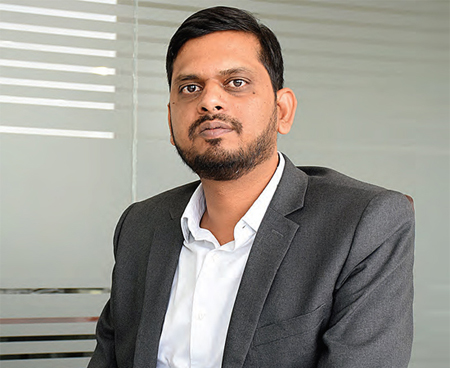
CC: What are the challenges in applying AI or ML to Indian farming sensibilities?
Adaptability is a major challenge in India because a majority of conventional agri enterprises view any form of a drastic change in digitisation with scepticism. The other common misconception is that the use of the application is purely to track them and evaluate their performance which distracts them from understanding the bigger picture. Mobility and literacy are the other hiccups. Though mobile communication and broadband connectivity are at their best yet, there continues to be limitations to connectivity in deeper rural pockets. There is much to improve with regards to rural literacy. These challenges affect Agtech companies in their reach in working directly with the farmers. CropIn has been proactively addressing the above issues, which has enabled us to tackle the barriers better than ever before and we have been able to impact more than 14 lakh farmers in India. Technology challenges us to stay updated with the latest advancement within the entire framework of a time-sensitive and cost-intensive process too.
CC: How can a farmer benefit from data-based farm solution tools?
Our SmartFarm application helps field staff associated with government projects, developmental agencies and agribusinesses to pre-configure a package of practices for each crop variety and send them as text messages on farmers’ mobile phones. A farmer database is created on SmartFarm that keeps a track of their historical performance, yearly income, and basic details on the farmer as a personal profile. The forms are completely customisable based on the requirement. SmartFarm provides the flexibility of setting up any type and number of crops and their varieties. The solution does set up configuration based on days to harvest, expected harvest per acre, allowed fertilisers and pesticides and addresses other general issues. The application enables an effective forecast of expected harvest quantity and dates and provides an optimised input plan (chemical application plan) for farmers. It thus makes the farmer future-ready with actionable insights, real-time alerts and acts as a knowledge repository containing collected data and data-driven analysis. Thus, it helps farmers in improving their agri skills, get an optimum price for their yield, and empower them with new or improved farming practices.
CC: Is there a cost-benefit to farmers in using your database tool?
Modern farming techniques help farmers with timely advisories that help increase agricultural productivity. The advisory cuts down avoidable costs by setting a clear activity plan for the crop and recommends the right input and the adequate quantity of agro-chemicals required at the right time. The field staff can configure these messages either based on weather alerts, or on-field activities for a particular crop cycle. Additionally, weather-based alerts go a long way in reducing crop loss and make agriculture climate-smart. The advisory also cuts down avoidable costs by setting a clear activity plan for the crop and by recommending the right input and the right quantity of agro-chemicals required at the right time.
CC: What is the advantage of digital tools over traditional farm sector practices?
Digital solutions can act as a direct channel between buyers and farmers by providing a platform to communicate the needs and understand the sources well. For farmers, digital solutions provide actionable insights by analysing data accurately and form a knowledge repository for the farmers to make them future-ready. Digital technologies also have made it possible for the farmer and the buyer to have a direct business relationship and eliminate the middleman.
CC: Can digital intervention eliminate the ‘middleman’ concept in agrarian India?
CropIn is bridging the gap between the most fragmented parts of the value chain with a focus on improving the lives of producers, businesses and consumers. We believe Agtech solutions can connect small and marginal farmers to alternate markets and help increase farmers’ income by reducing wastage across the supply chain. Most farmers cannot afford to take their produce to government-regulated mandis due to high transportation costs and storage issues and are often compelled to sell to middlemen at a low price. Using technology solutions, demand and supply can be monitored and farmers can claim a better price for their products and building better transparency in the supply chain system.
THE INDIA QUOTIENT
CC: What attributes to CropIn’s acceptability in the Indian farming sector?
We understand that farmers in India are not financially stable and cannot afford tech solutions and are sceptical about our services. Therefore, we cater to farmers indirectly through the B2B model. CropIn targets agribusinesses that impact farmers’ livelihoods as they are also concerned about farmer well-being. This ensures that competitive pricing is met while also increasing farmers’ incomes-a primary goal for us that creates a win-win situation for all. Our Agri-lending and Agri-insurance solutions have shown results and have impacted the farmers positively. Our solutions have made it easier for farmers to gain access to loans and has provided a credit assessment system for financial and lending institutions.
GLOBAL DENOMINATOR
"The company caters customisable AI and data-led Agtech solutions to clients in 56 countries and has been able to identify more than 9,500+ crop varieties and work with 388 different types of crops"
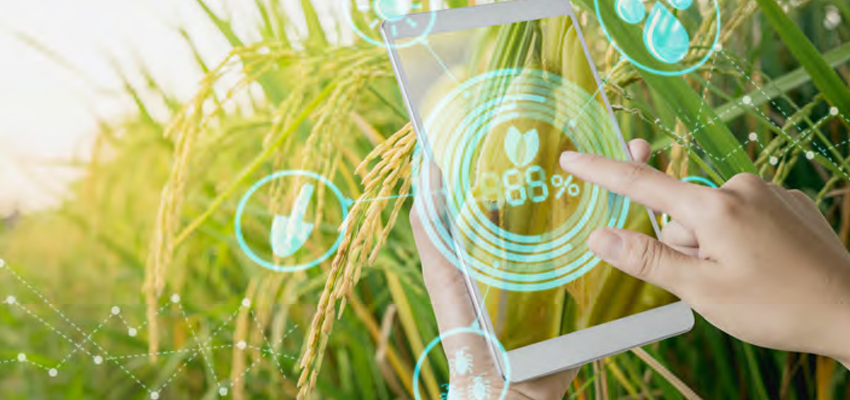
CC: What is your current operations’ reach?
In India, CropIn has offices in Bengaluru, Mumbai and Gurugram. We have recently established our physical office in the Netherlands as well. The company caters customisable AI and data-led Agtech solutions to clients in 56 countries and has been able to identify more than 9,500+ crop varieties and work with 388 different types of crops. CropIn has become the partner of choice for 200+ enterprise clients globally.
CC: What is the percentage break-up of your clients?
We have been leading the AgTech space in India owing to the success of our technology and have 47% of our customers from India. Our international geographies contribute 53% of the total clients’ base. CropIn has been working consistently on expanding into new geographies through dedicated marketing strategies. We are focused on identifying agricultural challenges in each geography and resolve them using its state-of-the-art technology. By customising solutions, based on the vagaries and location-specific challenges, we aim to be a one-stop solution to every agribusiness worldwide.
CC: What are the points that have clicked well for you, globally?
With the global population set to reach 10 billion by the year 2050, depleting water resources and with the impact of climate change being very real, a threat to global food security is looming over. It becomes a shared responsibility for every Agri stakeholder around the world to adopt measures and make smarter decisions to efficiently use scarce resources to have a chance at a sustainable future. CropIn’s innovations are crop and location-agnostic in nature which makes it scalable, customisable and integrable to the client’s requirements. The solutions act not only as problem solvers but also as knowledge repositories for the agribusinesses to be future-ready. The innovations are highly-efficient given they are data-driven and built on a 0.3 trillion datasets-based algorithm. The testimonials and a retention rate of 92% speak for themselves about the reliability of the solutions designed by us.
CC: Is there a difference in applying your solution drivers to India and the global markets?
CropIn solutions are crop and location agnostics and are easily customisable as per the client’s requirement. Thus, enabling high-speed and scalable technology implementations in the AgTech space on a global scale too. Our intention for an AI-based farm management business in India is to support farmers, improve per-acre yield and help different stakeholders in the Agri value chain. CropIn’s vision is aligned with the Central Government’s vision of doubling farmers’ income by 2022.
GROWTH AND DIVERSITY
CC: What is the mix and strength of your employee base?
CropIn is a 180+ employee strong company, operating from its four offices globally. We have a high-calibre team well versed in streams across technology, R&D, data science, sales and business development, marketing, and customer success. Some of them have degrees in agriculture. We also hire agronomists and scientists in our company.
CC: How do you foresee the future?
We are constantly innovating in addressing new and more complex challenges. We aim to expand our innovations into newer geographies, understand the region-specific challenges and make our innovations adaptive to those conditions. The intent has been proactive and positive. CropIn is:
- looking to explore the predictive and prescriptive analytics side of AI to deepen our farm - management system.
- working extensively towards building capacious AI innovations for addressing newer challenges.
- expanding our global presence further in the SEA (South East Asia), Africa, Europe, and the Americas.
- strengthen connectivity with the Agri ecosystem through partnerships with local companies through a channel partnership model. This is being achieved by diversifying into newer customer segments such as telecom, machinery, plantations while exploring other potential sectors.
CC: How did you convince ABC World Asia to fund your enterprise?
Sustainable food and agriculture are one of the focused themes of ABC World Asia and by supporting us they wanted to build resilience in agriculture by enabling farmers to utilise real-time data for better decision-making and improved farm productivity.
CC: What gives you the confidence to keep expanding?
There has been a lot of interest in Agtech solutions globally, mainly for the scale and the kind of impact it has been creating in the recent past. Through Agtech solutions, we are working towards building a socially good and valuable chain for the future. We wish to ensure sustainability in the Agri ecosystem and make agriculture more data-driven. Our investors believed in our vision and have shown trust in us by supporting our growth and our vision in building a sustainable AI community.